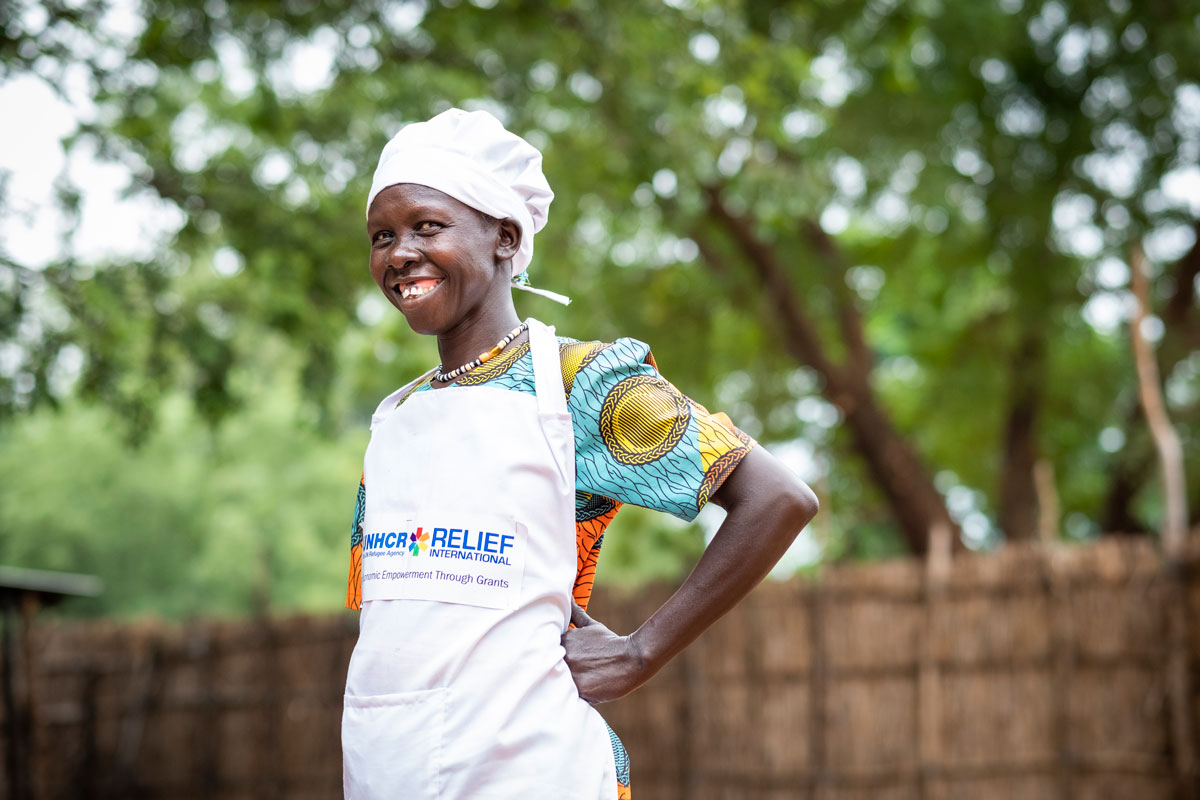Class is in session when we enter the courtyard at Relief International’s Vocational Training Center in Bunj, the county capital of Maban in South Sudan’s Upper Nile state. It’s just after lunchtime, and the smell of frying oil is wafting out of a classroom where 25 students are learning to make mandazi (donuts) — a common treat on the streets of the national capital, Juba, but a rarity here in Maban that will help their small restaurant and catering businesses stand out in a crowded marketplace.
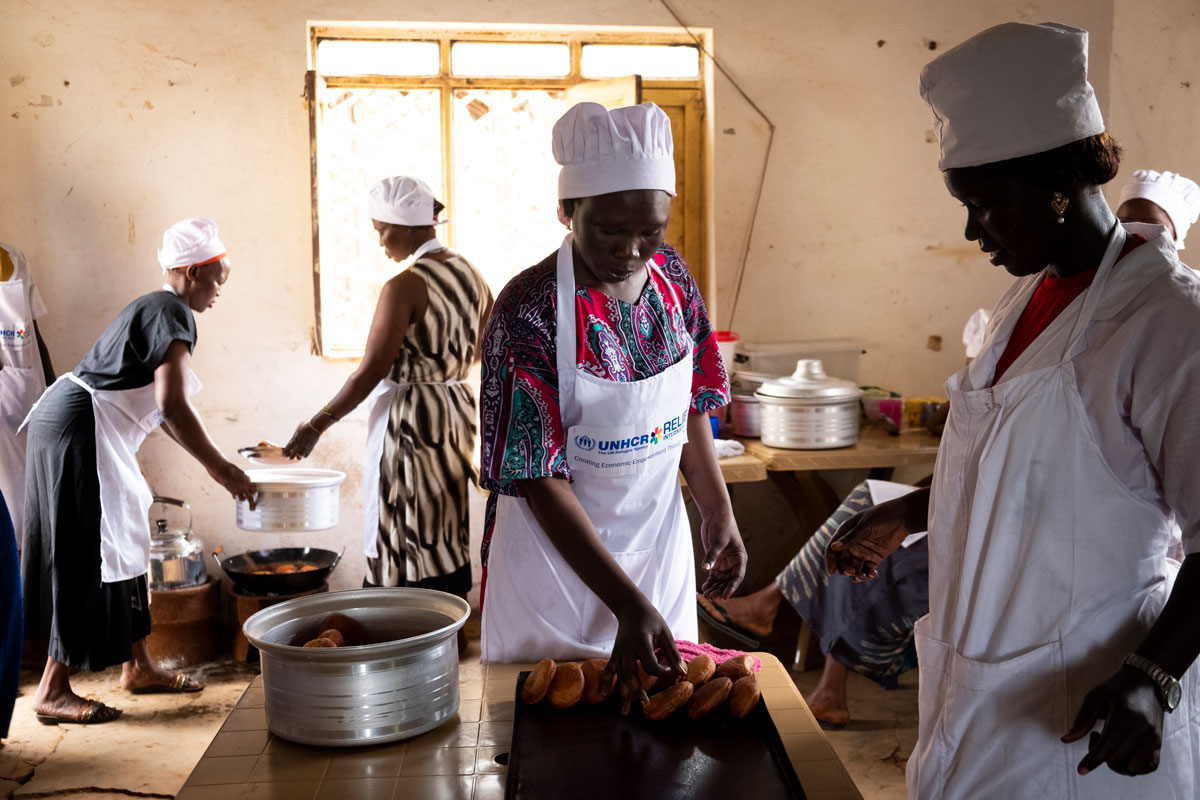
Relief International's trainer, Regina (far right), teaches the class how to make mandazi.
© Elie Gardner/RI
Students sit along the perimeter of the room in their crisp white aprons, attentively watching their teacher, Regina Kale, and two students mix locally sourced ingredients into dough, carefully shaping it into rings. Nearer the door, two more students are plunging the dough into hot oil, then lifting out the browned rings when they’re fully cooked. And there’s no shortage of people standing at-the-ready to do taste tests – these delicious treats strike just the right balance of sweet and savory, with a crisp shell and cake-like inside.

Freshly fried mandazi.
© Elie Gardner/RI
A Savvy Entrepreneur
One of the students in the catering class is 37-year-old Mariam Zakaria, a widowed refugee from Sudan’s Blue Nile state who has lived in Doro camp with her nine children since 2012. She’s one of more than 250,000 refugees that have crossed the Sudan border into South Sudan to date seeking safety. Some 148,000 are now living in four refugee camps near the town of Bunj.
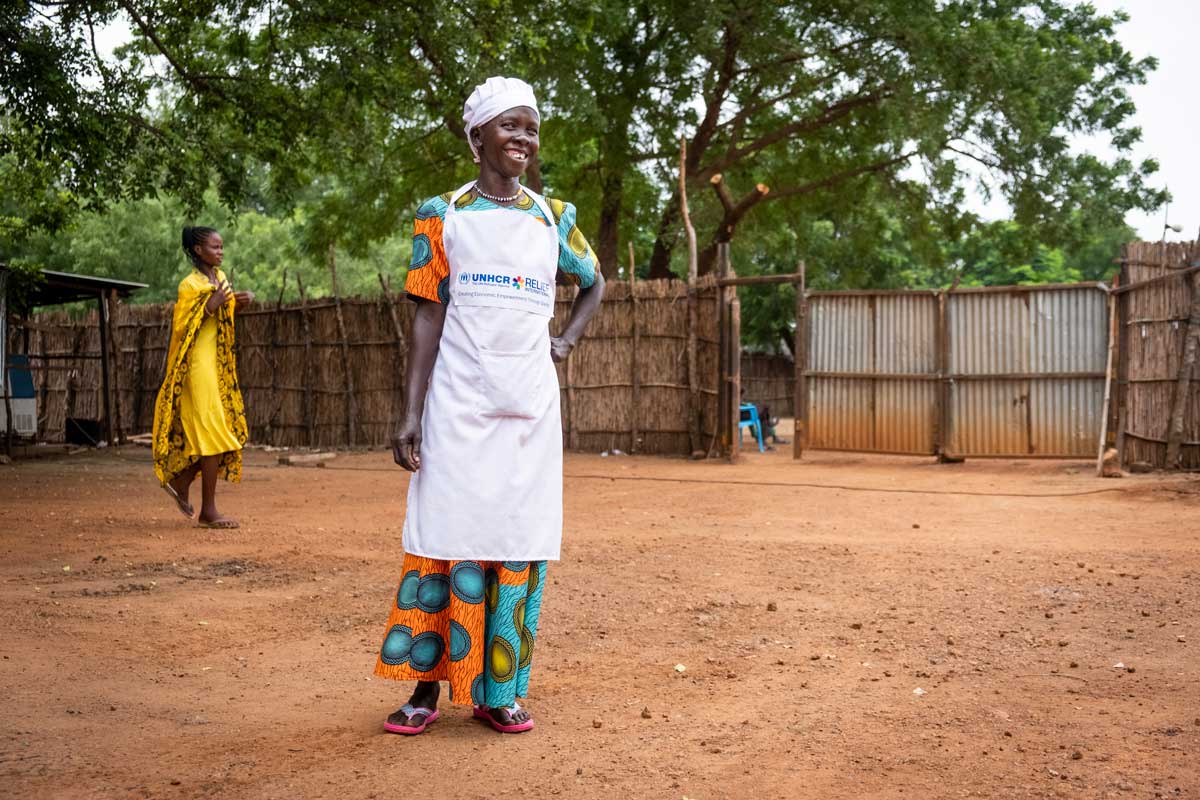
Mariam Zakaria stands in the outside courtyard of Relief International's Vocational Training Center, where she is attending a catering class to diversify her cooking skills.
© Elie Gardner/RI
Mariam is soft-spoken and a little shy, and as she shares pieces of her story it becomes apparent that beneath her modest demeanor is a savvy entrepreneur who is running multiple successful businesses. She is also very ambitious about the future. Miriam explains that she’s continuing to learn new skills at Relief International’s Vocational Training Center so that she can expand her businesses into more locations.
When Mariam and her husband fled conflict in Blue Nile, it took their young family a month to make their way to Maban. “We walked with a donkey that would carry our things. My children were very small, with the youngest just a baby, so when he was tired my husband and I would stop so the children could rest under trees,” she recalls. They finally arrived at their destination, but their perilous journey was far from over. “After two weeks of no food here we were starving, so my husband and oldest son, Abdalla, went back to find food.” Her husband was killed in an ambush, and her son, just seven years old at the time, had to make his way back to her on his own.
Though they received food rations in Doro, the largest refugee camp in the area, Mariam’s family struggled to keep hunger at bay. In 2015, the World Food Program’s overstretched budget for humanitarian emergencies forced a 30% cut in South Sudan’s food rations, leaving refugees to find ways to bridge the gap.
Abdalla once again had to take on responsibilities far beyond his years to support his family. He dropped out of school and did odd jobs around the camp to earn money, such as hauling heavy wheelbarrows of red clay soil. At age 10, Abdalla got steady work as a guard.
Mariam was also trying to earn an income for her family. She sold two of the three tables she had carried for miles from Sudan and used the money to buy tea and sugar. Mariam set up the remaining small metal table under a tree near the Freedom Market in Doro, which houses 61,000 refugees.
It was here that Relief International’s team of livelihoods experts first met Mariam. Her eagerness to establish and grow her tea shop was evident, and we invited her to compete for a small business grant. She created a business plan, pitched to a panel of judges, and in 2017 won an in-kind business investment award. “With my grant from Relief International I bought sugar, milk, butter, two jerry cans, a tank for water, and 12 cups,” says Mariam.
All of Relief International’s work in this border region of South Sudan is integrated, weaving health, nutrition, food security, and livelihoods activities
Relief International has given out 75 business investment grants since the vocational training program started in 2016. Previously, grants were given in-kind as materials, but in 2019 40 cash business investment grants will be awarded to individual entrepreneurs and group start-ups.
“Now that the market is fully functioning in Maban, we want to give grants as cash so that recipients have purchasing power and can support other businesses by buying local materials,” says Henry Omony, Relief International’s Food Security and Livelihoods Manager for South Sudan.
All of Relief International’s work in this border region of South Sudan is integrated, weaving health, nutrition, food security, and livelihoods activities – a concept that’s essential for sustainable development. Being a grant recipient, which provided for essential business investment capital, was a critical step in Mariam’s journey to becoming a successful business owner, but it’s equally important that she has access to business skills development, especially a foundational understanding of how to manage and maximize her earnings.
We encouraged Mariam to participate in our Village Savings and Loan Association program, which comprises sixty groups of approximately 20 members, mostly women, who work together to mobilize savings and gain access to capital. The groups meet monthly to learn simple finance concepts, buy shares, and manage earnings. Members can also take out loans from the group that are paid back with interest ranging from 10%-40%; the amount is the group’s decision. Every nine months the group splits the interest raised from the loans that members have taken out.
The grant was a catalyst to get Mariam’s tea shop off the ground, but she also used her newfound knowledge of microfinance to become a lender herself and boost her earnings even further.
“One tin of milk helped me make a profit, and I used that profit to start making loans to other people,” she says. “Over time, that interest was enough for me to buy a motorbike.”
Culturally, women in this region do not drive. “I don’t know any other women that own a motorbike,” Mariam says with a smile.
They’re a luxury in short supply regardless of gender, with the occasional one passing through the main dirt road in Bunj and a half-dozen lined up in the market area of each camp. Mariam uses her motorbike for rentals, as well as for hauling hard-to-get and lower-priced goods from the town of Bunj to Doro, where she resells them in the second shop she’s opened, housed next door to the permanent tea shop Abdalla constructed out of hundreds of slim, tightly bound branches.
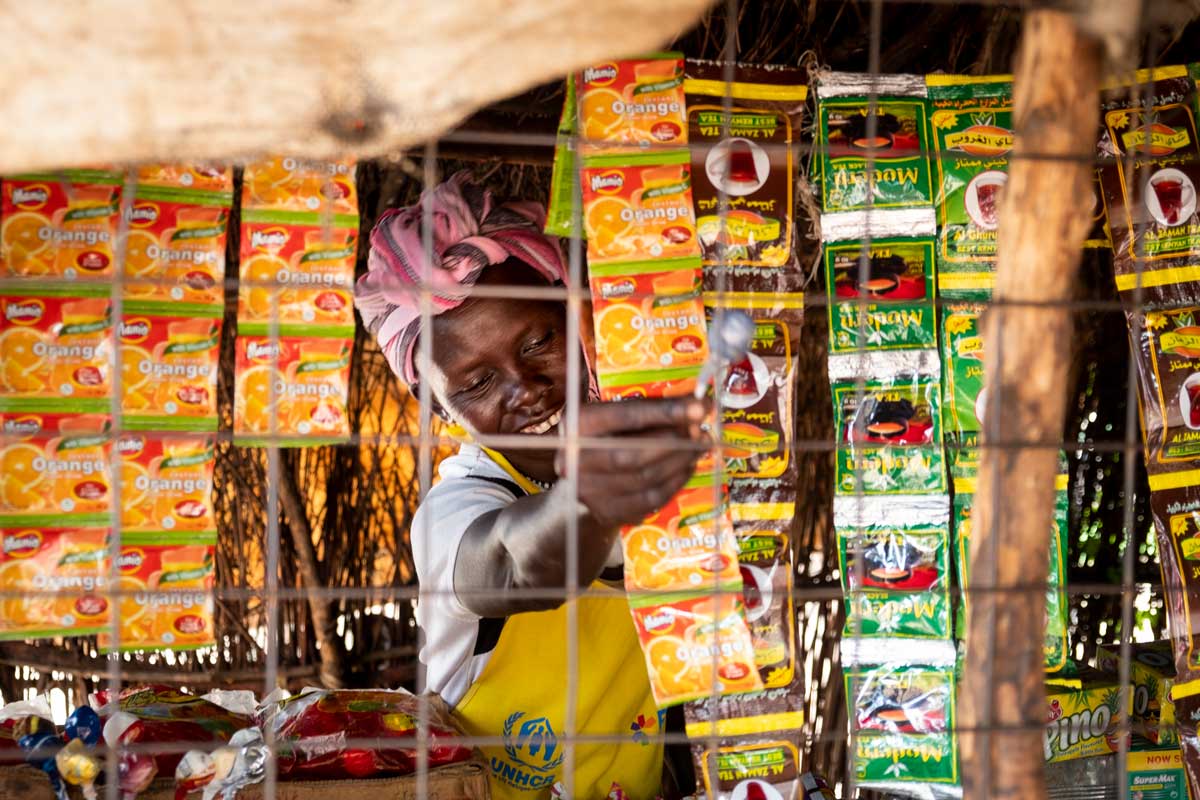
Mariam works in her second shop, which sells small goods purchased in the main town, Bunj, and transported to Doro camp on her motorcycle.
© Elie Gardner/RI
The tea shop offers a welcome respite on the side of the one-lane road running through Doro. Inside, two brightly colored plastic tables and a dozen chairs give customers a place to relax. When we arrive, black tea is brewing in metal teapots. Next to the fire, glass cups rest on the small metal table that’s been a mainstay in her shop.
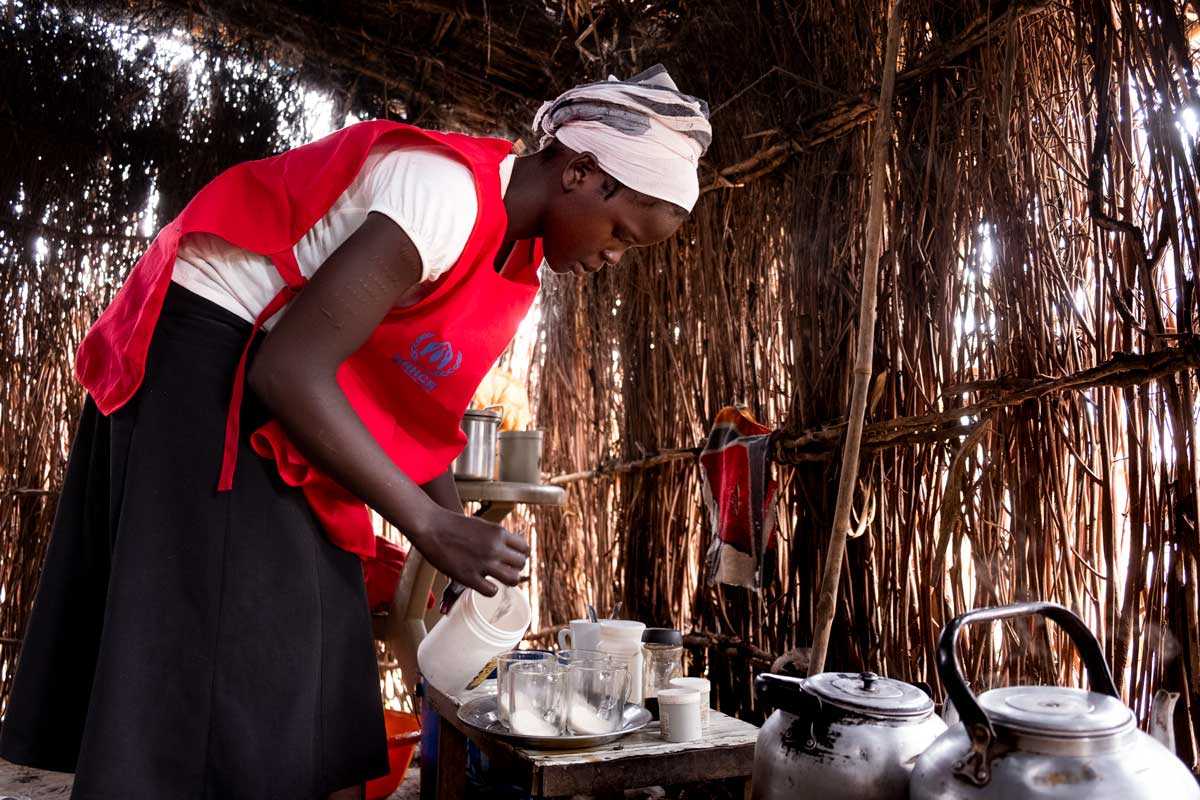
Narofi prepares tea on the small metal table Mariam carried with her from her home in Sudan.
© Elie Gardner/RI
Narofi, Mariam’s only employee, is also a refugee, and the job Miriam provided her is the only source of income for her widowed mother and six siblings.
Some days Mariam’s 10-year-old twin boys help her in the tea shop – but only when they’re not in school or studying. All nine of Mariam’s children are in school now, and her success has ensured their time and attention can now be on education first.
“I thank Relief International for the assistance,” says Mariam. “Life wasn’t easy before, but I was able to use my new knowledge to build a business and make a living.”
In addition to her tea and small goods shops, Mariam has purchased a plot of land in another Doro market area. “I’m still deciding if I will expand my shops or rent it out to another seller,” she says. Mariam is also busy fending off numerous offers of marriage – but, for now, she’s only interested in focusing on her thriving businesses.
